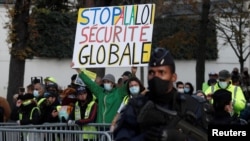A controversial security bill that is drawing protests from journalists and rights groups has cleared the lower chamber of France's National Assembly.
The so-called Global Security bill has sparked street protests and drawn angry criticism from media and rights groups that accuse the government of Emmanuel Macron of pushing illiberal measures akin to those of less developed democracies.
The law aims to improve regulations for the use of drones and dash cams by security forces. It also creates new rules for private security companies and new prerogatives for local police. But to some human rights activists, parts of the text are concerning.
Nicolas Krameyer, Amnesty International's France program manager, said it is concerning that the bill would enable vast surveillance against citizens, with police officers equipped with dash cams and the use of drones to monitor civilians during protests.
NGOs, including the press freedom group Reporters Without Borders, expressed concerns about the bill, especially Article 24, which would make it a criminal offense for anyone to disseminate images that — according to the text — might "harm the physical or mental integrity" of police officers.
Those found guilty could be punished by a year in prison or a fine of up to $53,000.
In a rare rebuke, the European Commission declared earlier this week that news media must be able to work freely.
France's Prime Minister Jean Castex discussed those concerns in a speech to French lawmakers this week.
Castex said the intent was not to restrain freedom of the press and freedom of expression, and no one would be prevented from shooting and sharing videos involving policemen. Article 24, Castex said, is meant to protect security forces.
French media professionals remain skeptical about the bill, which many of them believe could prevent them from reporting cases of police abuse.
Krameyer said that with this law, contrary to what the government says, any journalist and citizen would be in trouble if they report, shoot and share videos involving the police. He said he fears the law opens the door for arbitrary procedures by security forces.
The French Senate will vote on the Global Security bill in January. Castex has promised to ask France's high court to review — and possibly strike down — the bill.






